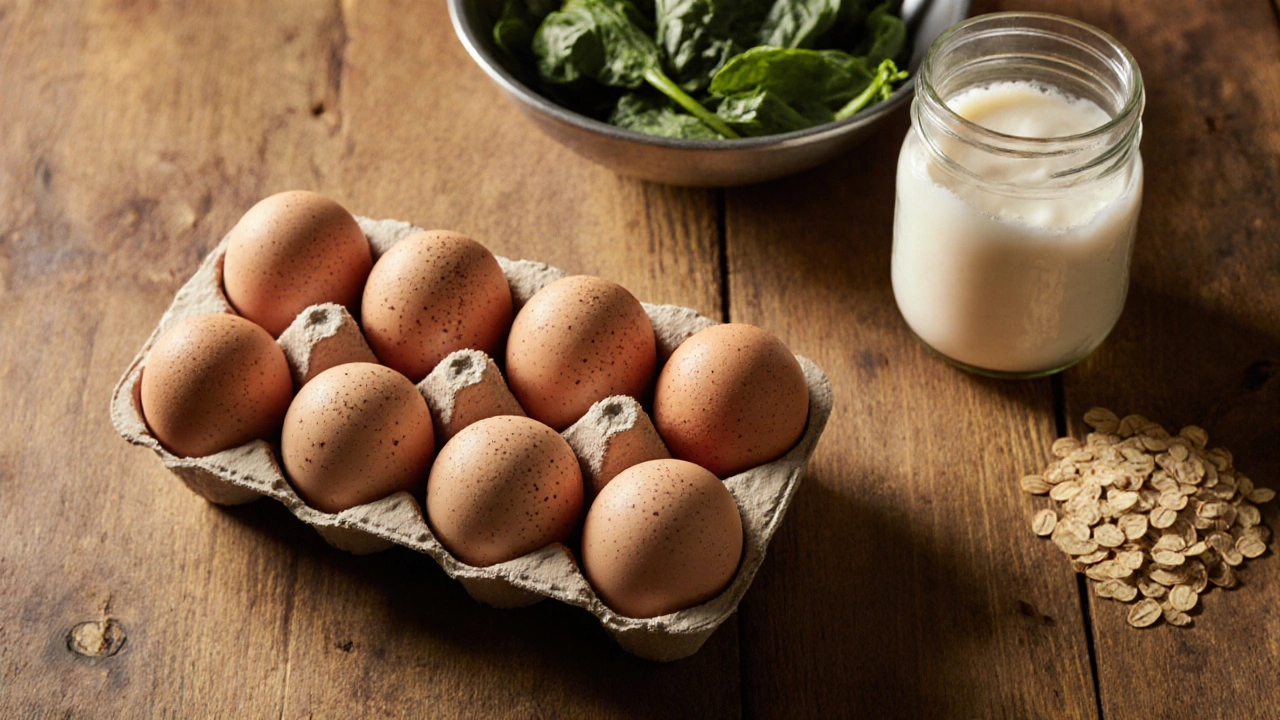Egg Nutrition Calculator
Your Daily Egg Intake Benefits
Total Protein: grams
Total Calories: kcal
Choline Intake: mg
Vitamin D: IU
Eggs
High protein, choline, and vitamin D
Oats
Rich in fiber and iron
Greek Yogurt
High in calcium and probiotics
Daily Recommendation
Based on your intake of eggs per day:
- Supports muscle repair and hormone production
- Provides essential nutrients for brain health and vision
- Helps maintain steady energy levels
- Contributes to a balanced diet with minimal calories
Remember to pair eggs with vegetables, whole grains, or lean proteins for a complete meal!
everyday food that’s safe, tasty, and packed with nutrition is a golden find. If you’re wondering which single ingredient can power your meals day after day, the answer is surprisingly simple.
Quick Take
- Eggs provide a balanced mix of high‑quality protein, essential vitamins, and healthy fats.
- One large egg costs less than $0.30 in most supermarkets and stores for weeks in the fridge.
- Versatile across breakfast, lunch, dinner, and snacks - scramble, poach, bake, or blend.
- Scientific research shows moderate egg consumption fits easily into a heart‑healthy diet.
- Address common worries like cholesterol and food safety with proven tips.
What makes a food safe to eat every day?
Before we crown a champion, let’s set the criteria. A food that can become a daily staple should meet four pillars:
- Nutrient density: It must supply a broad spectrum of macro‑ and micronutrients without excessive calories.
- Consistency: The nutritional profile should stay stable across batches and seasons.
- Affordability & accessibility: Price per serving and reliable supply matter for everyday use.
- Versatility: Ability to appear in multiple dishes keeps meals interesting and reduces monotony.
When you stack these pillars, very few foods qualify. That’s why the next section focuses on the one that checks every box.
Meet the champion: Eggs is a nutrient‑dense animal product that delivers high‑quality protein, essential vitamins, and healthy fats in a compact package
Eggs have been a dietary staple for centuries, and modern nutrition science backs their daily use. A single large chicken egg (about 50g) supplies:
- 6g of Protein - a complete source containing all nine essential amino acids, which supports muscle repair, hormone production, and immune function.
- Vitamin D (≈41IU), one of the few natural food sources of this sun‑derived vitamin.
- Choline - a Choline essential nutrient that fuels brain health and liver function in the highest amount per calorie of any food.
- Vitamin B12, riboflavin, selenium, and lutein/zeaxanthin for eye health.
- About 70kcal, making it a low‑calorie powerhouse.
Beyond nutrients, eggs deliver Omega‑3 fatty acids particularly when hens are fed a flax‑seed enriched diet, which aids heart and brain health. The synergy of protein, choline, and micronutrients means you get a balanced meal from just one ingredient.
How to incorporate eggs into every meal
Eating the same thing every day can get boring, but eggs are a chameleon in the kitchen. Below are simple ideas that keep variety high while staying quick.
- Breakfast: Classic scrambled with spinach, or a mushroom‑and‑cheese omelet. For a grab‑and‑go option, bake a frittata in a muffin tin.
- Mid‑morning snack: Hard‑boiled eggs peeled and seasoned with paprika, or an egg‑based protein shake (blend a boiled egg, banana, and milk).
- Lunch: Add a poached egg to a grain bowl (brown rice, avocado, roasted veg). The runny yolk becomes a natural sauce.
- Afternoon pick‑me‑up: Egg salad made with Greek yogurt and mustard, spread on whole‑grain toast.
- Dinner: Use eggs to bind a veggie stir‑fry, or top a bowl of ramen with a soft‑boiled egg.
- Dessert twist: Incorporate eggs into a light custard or a protein‑rich mug cake.
Each idea keeps the egg’s core benefits while changing textures, flavors, and accompaniments. The key is to pair eggs with vegetables, whole grains, or lean proteins for a complete plate.

Addressing common concerns
Even a superfood like eggs faces myths. Let’s separate fact from fiction.
- Cholesterol: One egg contains about 186mg of cholesterol. Recent guidelines from the American Heart Association state that dietary cholesterol has a modest impact on blood cholesterol for most people. Most healthy adults can safely consume up to one egg per day without raising LDL levels.
- Salmonella risk: Always store eggs in the refrigerator, discard any cracked shells, and cook them until both whites and yolks are firm if you’re pregnant, elderly, or immunocompromised. For a quick safety boost, use pasteurized eggs in raw preparations.
- Allergies: Egg allergy is common in children but often outgrown. If you’re allergic, substitute with tofu scramble or a chia‑seed “egg” for similar texture.
- Environmental impact: Choose eggs from cage‑free or pasture‑raised farms. These systems have lower carbon footprints and better animal welfare standards.
How eggs stack up against other daily foods
| Food | Calories | Protein (g) | Key Micronutrient | Cost per serving (USD) | Shelf life (days, refrigerated) |
|---|---|---|---|---|---|
| Egg (1 large) | 70 | 6 | Choline | 0.30 | 30 |
| Oats (½ cup dry) | 150 | 5 | Iron | 0.20 | 180 |
| Greek yogurt (150g) | 130 | 12 | Calcium | 0.90 | 14 |
| Banana (1 medium) | 105 | 1.3 | Potassium | 0.25 | 7 |
Eggs win on protein density, essential choline, and cost per gram of protein. Oats shine in fiber and shelf life, while Greek yogurt offers calcium and probiotic benefits. Bananas deliver quick carbs and potassium but lack protein. Depending on personal goals, you can pair eggs with one of these foods for a balanced daily regimen.
Practical tips for buying, storing, and cooking
- Buy smart: Look for cartons with the freshest "sell‑by" date and avoid any with cracked shells.
- Store right: Keep eggs in their original carton on a middle shelf-not the door-to maintain a constant temperature.
- Extend freshness: If you won’t use them within 3 weeks, freeze raw eggs (beat together first) for up to 6 months.
- Cooking shortcut: For a quick breakfast, microwave a whisked egg with a splash of milk for 60seconds; stir, then 30‑second bursts until set.
- Season wisely: A pinch of salt, pepper, and a dash of smoked paprika adds flavor without extra calories.
Next steps: building an egg‑centric meal plan
Start by mapping your current meals. Replace any ultra‑processed snack with a hard‑boiled egg or a mini frittata. Aim for one egg per day, but feel free to double up on active training days-research shows athletes can safely consume two eggs daily for extra protein.
Track how you feel. Most people notice steadier energy, better satiety, and easier weight management when they incorporate this simple food regularly.
Frequently Asked Questions
Can I eat eggs every day if I have high cholesterol?
Most recent guidelines state that dietary cholesterol has a modest effect on blood cholesterol for the majority of people. Consuming up to one egg daily is generally considered safe, especially when the rest of the diet is low in saturated fat. If you have a specific condition, talk to your doctor and monitor your lipid profile.
How long do boiled eggs stay good in the fridge?
Hard‑boiled eggs, left in their shells, keep well for about 7‑10 days when stored at 4°C (39°F). Peel them just before eating to maintain freshness.
Are there any vegan alternatives that match an egg’s nutrient profile?
No single plant food matches the complete protein and choline levels of an egg, but a combination of tofu (for protein) plus ground flaxseed or algae‑based supplements can approximate the nutrient mix.
What’s the best way to reduce salmonella risk when cooking eggs?
Cook eggs until both whites and yolks are firm-about 71°C (160°F). For recipes that call for raw eggs (e.g., Caesar dressing), opt for pasteurized eggs, which have been heat‑treated to kill bacteria.
Do eggs fit into a low‑carb diet?
Absolutely. One large egg provides only about 0.5g of carbs, making it an ideal protein source for ketogenic and low‑carb plans.

